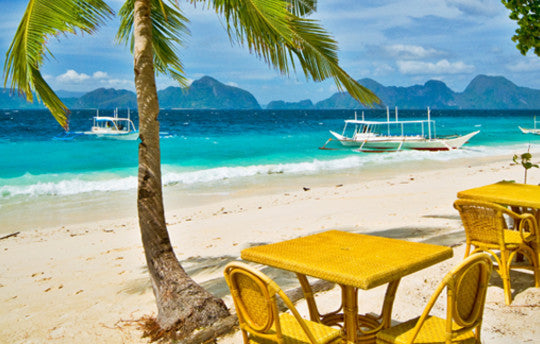Your Cart is Empty

With the summer just around the corner, and temperatures finally reaching a pleasant level in the UK, World Music Network is releasing two albums from two hot countries today; Reflections of Palestine by Ramzi Aburedwan on Riverboat Records, and the compilation album, The Rough Guide to Caribbean Café on Music Rough Guide.

Born and raised in Palestine, Ramzi Aburedwan discovered his musical talent in his late teens, upon which he went abroad to France to study at the National Conservatory of Angers. Ramzi has become a world-class solo virtuoso on the viola and the bouzouk, a traditional Palestinian long- necked lute related to the Greek bouzouki and Turkish saz, He is also leader of the esteemed The Palestine National Ensemble of Arabic Music and is the founder of Al Kamandjâti, a music school in his home country.
In Reflections of Palestine,Ramzi is accompanied on the oud, accordion, clarinet and percussion. Each song in the album, all composed by Ramzi, narrate stories of his life. The opening track, 'Rahil', meaning 'Exile', relates to Ramzi's grandfather who was forced to leave his home amongst the eucalyptus trees and sweet smelling citrus orchards, to live in compulsory exile in Al-Amari, a refugee camp in Ramallah, West Bank. Accompanied by the slow accordion drone at the opening of 'Rahil', Ramzi articulates harmonious chords on the bouzouk. Excitement is expressed when the percussion joins in and the tempo picks up after which the music however returns to a slow and melancholic sound. The change of dynamics in the song no doubt refer to the tumulous emotional state of those living in exile. Curious? 'Rahil' is available as a free download, just click on the link below. Otherwise, have a listen to Reflections of Palestine.
Order your copy of Reflections of Palestine here
Click here for a free downloadable track of Reflections of Palestine
Ramzi's succesful international career, talent and music remind us of Palestine being more than a country in dismay; it is a place of rich culture, creativity and beauty. Reflections of Palestine is hereof an example. Ramzi Aburedwan's aims to promote peace, with music as his weapon of choice.
The Rough Guide to Caribbean Café is a sunny collection illustrating the melting pot of music from indigenous, African and European people from the Caribbean Islands; styles vary from Jamaican reggae, to Cuban son, Trinidadian calypso to Martinican zouk. Let yourself be transported from island to island and enjoy this showcase of the most diverse Caribbean songs in which the rich musical history of the Caribbean is narrated with slick grooves and infectious rhythms. The album opens with a bouncing track by Ska Cubano and their brilliant fusion of ska, Cuban son, cumbia and calypso. Another Afro-Cuban performance comes from Septeto Nacional de Ignacio Piñeiro. Boukman Eksperyans bring their trademark Haitian carnival-voudou-pop beats. Yuchi Cordoba is from Curaçao and brings the percussive up-beat flavour of the ABC Islands into the mix. Aurelio is an artist from the Garifuna community in Honduras, and has enjoyed international sucess. Listening to his smooth soulful style as on the track ‘Lubara Wanwa’ it is easy to see why. ‘Little Nassau - Bahama Mama’ is a vintage calypso number from Bahamian performer Andres Toussant, and ‘Leave Us Alone’ is a modern reggae pop anthem from the Jamaican artist Gyptian.
Next time you have some friends over for a BBQ, why not put The Rough Guide to Caribbean Café on to complete a relaxing and summery get-together?
Order your copy of The Rough Guide to Caribbean Café here

What's more, with The Rough Guide to Caribbean Café comes a bonus CD by Dédé Saint-Prix, Fruits de la Patience. Patience is indeed required for Dédé’s fans as this giant musician from Martinique releases only ever so often; apart from his own performances and recordings, he also produces albums for other musicians, works on several musical projects, and teaches at schools and hospitals in order to pass on the Martinican musical baton. As a respected and experienced artist, Dédé is in a position where he has the freedom to write politically charged lyrics on social injustice. On top of this he has been able to be in chargeof many other aspects regarding the creation of the album, such as control over the recording sessions and the final mix. The rhythm in the album is mainly focussed on Chouval Bwa, a typical rhythm from Martinique in the music that used to accompany the horses on the merry go round at local festivals. Dédé has been a key figure in the revival of Chouval Bwa, emphasising its youthful and festive spirit, by including this in his work. That the music is good-humoured can be heard in the laughs occasionally accompanying Dédé’s voice, bamboo flute and percussion. Fruits de la Patience is his latest, most refined example. But Dédé wouldn’t be Caribbean if he would exclude other music styles strongly present in his performances; ragga, salsa, zouk, kompa, soul and reggae are thus all found in Fruits de la Patience. And with the central role Dédé plays in Caribbean music, we thought there would not be a better album than Fruits de la Patience to accompany The Rough Guide to Caribbean Café.
Watch a video of Dédé Saint-Prix live in Paris here: